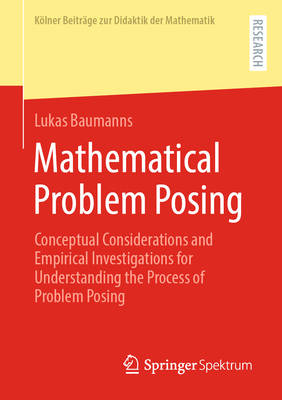
- Afhalen na 1 uur in een winkel met voorraad
- Gratis thuislevering in België vanaf € 30
- Ruim aanbod met 7 miljoen producten
- Afhalen na 1 uur in een winkel met voorraad
- Gratis thuislevering in België vanaf € 30
- Ruim aanbod met 7 miljoen producten
Zoeken
Mathematical Problem Posing
Conceptual Considerations and Empirical Investigations for Understanding the Process of Problem Posing
Lukas Baumanns
€ 79,45
+ 158 punten
Omschrijving
Mathematical problem posing as the substantive formulation of mathematical problems is an activity that lies at the heart of mathematics. In recent years, research in mathematics education has endeavored to gain insights into problem posing--conceptually as well as empirically. In problem-posing research, there has been a focus on analyzing products, that is, the posed problems. Insights into the processes that lead to these products, however, have so far been lacking. Within four journal articles, summarized in this cumulative dissertation, the author attempts to contribute to the understanding of problem-posing processes through conceptual considerations and empirical investigations. The conceptual part consists of a conducted systematic literature review to investigate problem-posing situations and problem-posing activities. The studies in the empirical part deal with the analyses of problem-posing processes of pre-service mathematics teachers from a macroscopic and microscopic perspective. The aim is to develop coherent and meaningful conceptual perspectives for analyzing empirical observations of problem-posing processes.
Specificaties
Betrokkenen
- Auteur(s):
- Uitgeverij:
Inhoud
- Aantal bladzijden:
- 301
- Taal:
- Engels
- Reeks:
Eigenschappen
- Productcode (EAN):
- 9783658399160
- Verschijningsdatum:
- 20/11/2022
- Uitvoering:
- Paperback
- Formaat:
- Trade paperback (VS)
- Afmetingen:
- 148 mm x 210 mm
- Gewicht:
- 421 g

Alleen bij Standaard Boekhandel
+ 158 punten op je klantenkaart van Standaard Boekhandel
Beoordelingen
We publiceren alleen reviews die voldoen aan de voorwaarden voor reviews. Bekijk onze voorwaarden voor reviews.











